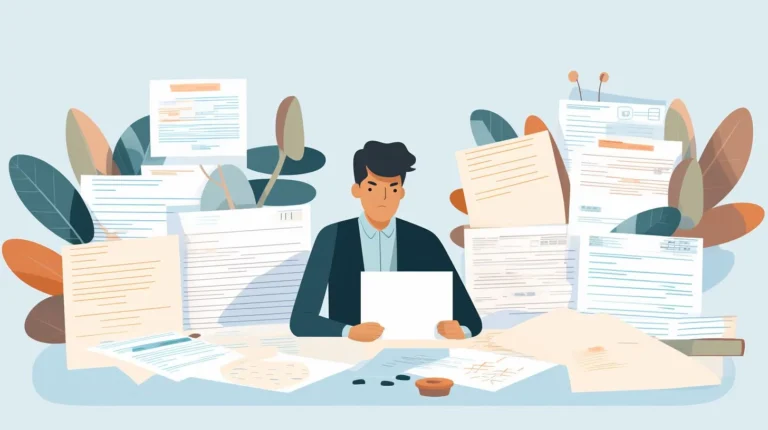How to Read Your Credit Report

Unraveling the mysteries of a credit report can often feel like wading through a dense, confusing jungle. Believe me, I know how that feels – it’s as if we’ve to be part-time cryptographers just to make sense of our own financial documents! But don’t worry; I did the legwork and wrangled with those bewildering codes and jargon until they started making sense.
Through this article, consider us your friendly guide, helping you step by step in understanding all significant aspects of your credit report. So buckle up, because we’re about to simplify that multifaceted credit profile you’ve been scratching your head over!
Key Takeaways
- A credit report is a record of your money habits. It shows if you pay back loans and bills on time.
- Checking your credit report each year helps keep it error – free and healthy. You can get this for free online.
- The main parts of the report are personal details, job info, public records, inquiry data and financial history.
- Key terms like ‘Accounts’, ‘Negative Information’, ‘Inquiries’ help read the report well.
- Errors can harm your financial health so spotting them early is important. Dispute any mistakes right away to fix them.
- Some facts like salary or partner’s scores aren’t in the credit reports at all.
Understanding What a Credit Report Is
A credit report is a close look at your financial life. It shows how you handle money. If you take out a loan, it goes into this report. Any bills that go unpaid also show up here.
The top three reporting bureaus make these reports.
Why does this matter? When you apply for a loan or credit card, lenders look at your credit report. This helps them decide if they can trust you to pay back the money. A good credit report makes getting loans easier and better deals more likely.
This is why it’s key to check your own credit report each year! You can spot mistakes early on and fix them before they harm your scores.
How to Obtain Your Free Credit Report

Getting your free credit report is simple. These are the steps:
- Go to AnnualCreditReport.com.
- Choose the option to request your free credit report online.
- Fill out a form with your personal information.
- This includes your Social Security number and birth date.
- Pick which reporting bureau you want the report from. You can choose Equifax, Experian, or TransUnion.
- Each year, you can get one free copy from each of these bureaus.
- Answer some questions to prove who you are.
- Once done, you can view your report.
- It’s smart to save a copy or print it out for later use.
Navigating Your Credit Report
Navigating your credit report may seem perplexing, but it’s actually a simple task if you understand the sections: personal information, employer history, credit history, public records and credit inquiries.
Each part has distinct details that paint a clear picture of your financial health. Not sure how to decode all this? Hang tight for my detailed breakdown of each section; I promise to keep it stress-free!
Personal Information
Your credit report has a part called “Personal Information”. This is where you find your name, date of birth, Social Security Number, addresses, phone numbers and job data. It’s key to make sure everything in this part is correct and up to date.
Wrong info could hurt your credit score or show that someone may be using your identity. You play a big role in keeping this info safe and correct!
Employer History
Your credit report has a part with your job info. It lists where you have worked and for how long. You should check this to make sure it’s correct. Errors can hurt your credit score or point to someone stealing your identity.
If you find wrong or strange job names, you can dispute them. Bring papers that show the right stuff. A law called the Fair Credit Reporting Act says mistakes on this part of the report must be fixed or removed within 30 days.
Credit History

Your credit history shows how well you have done with money in the past. It lists all your loan amounts, current balances and whether your loans are on time or late. Lenders use this data to know if they should give you more money.
They want to see if you can handle it well. A good credit score comes from a strong credit history with few or no missed payments and low account balances compared to credit limits.
I check my own report often so that lenders see me in a fair light.
Public Records
Public records show up on your credit report too. They are data from state and county courts, as well as U.S. bankruptcy courts. These can point to bankruptcies, foreclosures or tax liens against you.
This kind of info can seriously hurt your credit score.
The Fair Credit Reporting Act (FCRA) says how long public records may stay in a report for all to see. For example, Chapter 7 bankruptcies stick around for ten years from the filing date.
Chapter 13, which lets you pay off some debts over time through income-based repayment plans, also stay for seven years after it’s paid off fully.
Credit Inquiries
Credit inquiries happen when someone looks at your credit report. Lenders do this to see if you can be trusted with money. There are two types, hard and soft. Hard ones may lower your credit score for a short time.
Soft ones don’t affect your score at all. A good tip is to only apply for new credit when needed to keep hard inquiries low.
Importance of Credit Reports
Credit reports play a big role in your life. They show how you handle money. Banks look at them when you want to borrow money. Also, some jobs will check them before they hire you.
A good credit report can help make life easier. You get lower rates on loans and credit cards. It might even help with landing the job of your dreams! Make sure to keep track of what’s inside it.
Bad info can stay on for seven years or more, which hurts your financial prospects. Regular checks make sure all facts are right and no one is using your name to steal.
Your health is key just like keeping an eye on this important piece of paper hacks into that maze we call personal finance!
Understanding Key Terms

To successfully navigate your credit report, you’ll need to get comfortable with the language of finance. Get familiar with key terms like ‘Accounts’, which are all the places where you’ve been granted credit; ‘Negative Information’, outlining any missed payments or issues on your lending history.
Don’t overlook ‘Inquiries’, a log of who accessed your file; and grasp how a sound payment history can work in favor of your score. Understand what account balances mean, and how an optimal mix of different types of credit plays into rating algorithms.
Accounts
Your credit report has an “Accounts” section. This part holds details on all your past and current credits. You will see the names of lenders that gave you a loan or a card. It also lists when these accounts were opened.
In this area, you can even find facts like your loan amounts, balances, and payment history. Watch out for any wrong data in the list!
Negative Information
Bad things can show up on your credit report. These are called negative information. Things like bankruptcy and past due accounts count as negative information. Sometimes, mistakes cause bad details to appear on your credit report.
Fixing these errors is crucial for keeping a clean financial status and maintaining a good credit score. A collection account or bankruptcy harms your financial health, too. It is very important not to let this happen.
Inquiries
Inquiries show who looked at your credit report. They come in two types: hard and soft. Hard inquiries happen when you apply for a loan or credit card. These can lower your score a bit.
Soft inquiries don’t affect your score. These are checks by companies that want to give you something like a pre-approved credit offer, or by landlords checking on tenants. Both kinds of inquiries go into one section of the report, so it’s easy to track them all.
Payment History
Your payment history is shown on your credit report. It has all the bills you paid, both on time and late ones. This part of the report is a big deal! Lenders look at it to see if you are good at paying back money loaned to you.
Watch out for late payments, unpaid loans or bankruptcies here — they may hurt your credit score.
Account Balances
Credit reports don’t show account balances. That’s a hard fact to take in, but it’s true. You won’t know how much is left on your credit card or loan by looking at your report.
Why is that so? Well, credit reports focus more on your payments made over time. They track if you pay late and how often that happens. But the exact amount of money in an account is not part of this track record.
It all comes down to how well you manage what you owe instead of how much you owe at any one point.
Credit Mix
Credit cards, loans and mortgages make up your credit mix. Having many kinds of credit can pump up your score. Why? It shows you know how to use each one well. So, try having different types of credit in a healthy way!
Identifying and Disputing Errors on Your Credit Report

Keeping your credit report free of errors is important. Here are some steps to identify and dispute mistakes:
- Review your credit report in detail. Look for anything strange like accounts you did not open or account numbers that do not match yours.
- Check the status of each account. Mistakes may come in the form of an incorrect account status.
- Scan your addresses listed on the report. If you see any places you have never lived at, it could be a sign of error.
- Collect proofs to back up your claim such as bank statements, loan papers or even credit card bills.
- Use these documents to dispute errors online for Experian, TransUnion, and Equifax.
- Stay persistent until the issue is resolved. The Fair Credit Reporting Act (FCRA) says that wrong facts must be fixed or taken off from credit reports within 30 days.
What Information is Typically Not Found on Your Credit Reports?
While your credit report provides a comprehensive look at your overall financial health, it doesn’t include all aspects of your life such as salary, employment status, marital status or spouse’s credit history.
Dive in to discover why these areas remain separate and the importance of understanding what isn’t included on your credit report.
Salary
You might think your salary shows up on your credit report. But it does not! The money you make at your job is kept private. Credit reports don’t talk about how much money a person earns.
They only show if you pay bills on time and how you handle debt.
Your lender may ask about your income when giving out loans or credit cards, but this stays between you two. It won’t appear on the report that they pull from the bureaus like Equifax, TransUnion, or Experian.
This also means anyone looking at your credit, such as landlords or potential employers, can’t see what you earn either!
Employment Status
Your job is not on your credit report. It doesn’t matter if you’re a teacher, doctor, bus driver or a CEO. This means that whether you work full time, part time or have no job does not change the score on your credit report.
So go ahead and keep doing what you do best!
Marital Status and Spouse’s Credit History
Your credit report is all about you. It does not show your spouse’s details. This means your marital status or your spouse’s credit score won’t be seen there. You can check it alone and find no names of past husbands or wives.
Still, some things may need fixing if they got mixed up on joint bank accounts or credit cards with a former mate. To correct these problems, get the needed papers ready to prove who you are and how things should stand now in financial terms.
Assets

You might think your assets count on your report. This is not true. Your house, car and bank savings won’t show up there. These things don’t tell credit firms if you can pay back money you borrow.
So they stay off your credit report.
401(k) Loans
A 401(k) loan doesn’t show up on your credit report. It is different from other kinds of loans. No one will check your credit before you get this type of loan. Also, it won’t affect your credit score.
What if you need to borrow money? You could take out a 401(k) loan and it wouldn’t change the amount of debt on your credit report. Even paying back a 401(k) loan won’t have an impact on your payment history listed in the report.
How Does My Credit Report Impact My Mortgage Approval Decision?
How Does My Credit Report Impact My Mortgage Approval Decision? Your credit’s role in mortgage approval cannot be understated. Lenders carefully assess your credit report to evaluate your creditworthiness and determine the terms of your mortgage. A good credit history can increase your chances of approval and help secure favorable interest rates. Conversely, a poor credit report may result in a higher interest rate or even denial of your loan application. So, it’s essential to maintain a good credit score and resolve any credit issues before applying for a mortgage.
How to Protect Your Credit Report from Identity Theft
Taking care of your credit report is a big part of staying safe from identity theft. Here are ways to do it:
- Keep track of your credit reports. People who watch their reports well can spot signs of identity theft fast.
- Consider putting a freeze on your credit report. This keeps bad guys from seeing your data.
- Think about using fraud alerts. They can stop thieves from opening new accounts in your name.
- Ask for free copies of what’s in your file if you have put on a fraud alert.
- If you think someone has stolen from you, let the agencies that share credit info know right away. They can stop sharing the wrong info about you.
- If you find errors in what the agencies say, tell them they’re wrong and show them why with proof.
Conclusion
Knowing your credit report matters a lot. It tells people if you pay bills on time or if there are mistakes that hurt your score. Guard it from thieves who may steal details to pretend they are you.
In the end, stay aware to keep good credit health and gain trust in money matters.
FAQs
1. What is a credit report?
A Credit Report is a record of how you handle your money, loans, and credit cards. It shows your financial decisions and reveals if you have delinquent or charged off loans.
2. Why should I review my Credit Report?
Reviewing your Credit Report will help identify any incorrect or outdated information, helps with identity verification when applying for loans and affects the interest rates on loan conditions.
3. How does the information on a Credit Report impact me?
The data in your Credit report can affect many things like insurance premiums, loan terms from financial services providers, eligibility for certain jobs – significantly impacting your financial journey.
4. Can wrong info appear in my credit report?
Yes! Incorrect info may be due to typographical errors during debt recovery or when reporting data; it could be an indication of fraudulent activity such as opened accounts without consent (fraudulent accounts). Correcting these mistakes helps maintain accurate score calculations enhancing credit-worthiness
5. How do I correct errors in my Credit_Report?
Firstly identify the error then dispute them by contacting either consumer support services provided by the three key Bureaus (Experian, Equifax & TransUnion) which tracks all these records (& updates associated VantageScore 3_0 systems), or address them directly with related businesses
6.What kind of info appears inside a typical credit_report?
Credit reports typically include personal details like Name_Variations & Year_of_Birth, account amount history (from revolving_credit_accounts / installment_loans through student_loans up_to auto bankloans), listed responsible party (“Responsibility”), Payment_Status among other particulars – enabling potent assessments regarding customer trustworthiness & compliance against norms.






